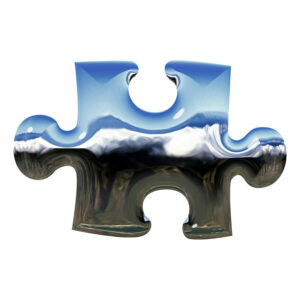Puzzle competitions are so much fun! Yet, so many people ask me how to win a jigsaw puzzle competition, and I always respond, you need fierce spatial skills. While many people think jigsaw puzzle competitions are all about moving the pieces quickly, if you don’t have spatial association skills, it’s impossible to compete on the top level.

What are Spatial Skills & Why do Players Need Them?
The definition of spatial awareness is an ability to be aware of oneself in space. Going a step further, when we were kids, we played puzzles to learn about the physical and mental manipulation of shapes and objects as we learned to understand how to recognize objects in different orientations. Basically, we could envision where the tail would be on the dog. Or how big the ice cream scoop would be on top of the cone.
As adults, it becomes second hand to use this skill. However, some of us become comfortable with what we learn and stop exploring it further. Others develop skills to help understand spaces and objects even further. Many of those folks who developed skills like this are amazing jigsaw puzzle competition players.
Table of Contents
Puzzle Competitions Need Spatial Skills.
In the realm of puzzle competitions, spatial skills have been my trusted companions, guiding me through the intricacies of jigsaw puzzle solving. These jigsaw puzzle competitions are not just about assembling pieces; they’re about honing one’s spatial awareness to a razor’s edge. Seeing pieces before other people see them. My journey has been a testament to this truth and I can’t be more excited to share what I have learned.
As I dove into my first puzzle competition, I realized the importance of quickly determining the correct orientation of puzzle pieces. Perhaps, I needed more practice, but I took the challenge with glee. It was like navigating through a maze in the dark, but with each piece, my spatial skills sharpened. Over time, I found myself effortlessly rotating pieces in my mind’s eye, fitting them snugly into the puzzle’s evolving landscape. In the end, my first speed puzzling effort was disastrous. I did terrible because I didn’t practice my spatial skills. Or as I like to say, I had “normal” puzzle solving skills.
Practicing Spatial Skills Brings Wins (and Decreases Time)
One particular competition stands out in my memory and it was after I practiced daily for weeks prior to the USA competition. At the puzzle competition, the shapes and contours of the puzzle pieces seemed to dance before my eyes. Amidst the flurry of activity, my spatial reasoning kicked into overdrive, allowing me to swiftly analyze each jigsaw piece’s unique characteristics. It was a moment of clarity amidst the chaos, a testament to the power of spatial skills in competitive puzzle solving.
As the competition progressed, I found myself drawn to the vibrant patterns and colors within the puzzle image. I’m not going to lie, I don’t exactly understand why looking at a puzzle differently works when using spatial skills (I’ don’t even ‘m not a doctor nor do I play a doctor on TV), but it turned my game around immensely. Like a painter with a palette, I quickly selected pieces that matched the hues and designs. It was guided by my innate spatial intuition.
How to Increase Your Spatial Awareness
Believe it or not, many suggest playing jigsaw puzzles to help increase your spatial awareness, but if you are like me and already do that, then you need to do more. Practicing puzzles does help, but you need to have another realm to beef up your skill set. I’ve found that playing video games help immensely (yes, it’s true, I’m the only 59-year-old playing Halo 3 in my house). Another great way to work on your skills is exercising (mine is Pickleball) and in particular sports that have moving parts. Finally, it’s suggested you pick up another hobby that uses your hands, like sewing, drawing or even pottery.
Competitive Puzzling Journey Grows
With each piece that fell into place, my confidence grew, fueled by the knowledge that my spatial skills were leading me ever closer to victory. Perhaps the most exhilarating moments came when faced with gaps between assembled sections. With my spatial awareness, I navigated these gaps with precision and finesse, seamlessly filling them with pieces that fit like missing puzzle pieces of my own life story.
Through countless competitions and endless hours of practice, my spatial skills have become my greatest asset in the world of jigsaw puzzle solving. Now, I’ve decreased my speed puzzling times significantly and I share with all my pals to improve, use and practice spatial skills. This is how to win a puzzle competition and decrease your times.
As I continue on my competitive puzzling journey, I am reminded that in the realm of puzzle competitions, spatial skills are not just tools—they are the key to unlocking limitless possibilities of putting together the pieces quickly. And I continue to strive for my best completion time.
